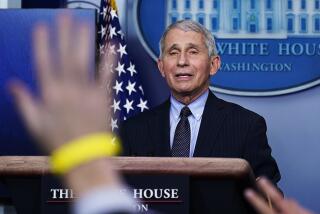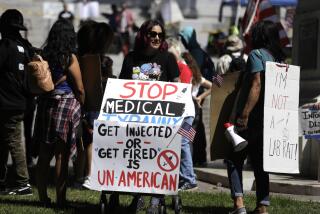Scientist Angrily Denies Role in Anthrax Attacks
- Share via
WASHINGTON — A bioterrorism specialist whose home has twice been searched for clues to last fall’s anthrax killings lashed out at the FBI and publicly declared his innocence Sunday, saying he had “never ever worked with anthrax in my life.”
In a news conference outside his lawyer’s office, Steven J. Hatfill affirmed his loyalty to America, and his horror when the tainted letters killed five people and made at least 13 others ill. In strained tones, he also described the nightmare he has endured since his name surfaced in the investigation.
“I acknowledge the right of the authorities and the press to satisfy themselves as to whether I am the anthrax mailer. This does not, however, give them the right to smear me and gratuitously make a wasteland of my life in the process. I will not be railroaded,” Hatfill said.
“I’m a loyal American and I love my country. I’ve had nothing to do in any way, shape or form with the mailing of these anthrax letters.”
The FBI has never identified Hatfill as a suspect in the case, though it has called him “persons of interest.” Nevertheless, agents recently have ratcheted up their interest in the 48-year-old bioweapons researcher, who worked at the Army Medical Research Institute of Infectious Diseases at Ft. Detrick, Md., from 1997 to 1999.
Appearing publicly for the first time Sunday, Hatfill described how FBI searches of his home--one voluntary, one with a warrant--were turned into media circuses, complete with helicopters and television cameras, and how FBI agents “manhandled” his girlfriend when her apartment was searched.
Hatfill’s attorney, Victor M. Glasberg, also alleged that the FBI leaked to ABC News information collected during one of those searches: Hatfill was writing a novel about bioterrorism.
The FBI, the U.S. Postal Inspection Service and other federal law enforcement agencies involved in the investigation had no official comment Sunday in response to Hatfill’s news conference.
“It’s all part of an ongoing case. Nobody has been charged. Beyond that, there is nothing we can say,” FBI spokesman Paul Bresson said.
While Hatfill’s is the only name that has been mentioned in the media, one senior federal law enforcement official said he was among about 20 scientists who are considered “persons of interest” based on their specific scientific knowledge and access to facilities where anthrax is grown or studied. The official, like others, spoke on the condition of anonymity.
But officials at several law enforcement agencies acknowledged that while they may not have singled Hatfill out as a suspect, they have aggressively investigated him to determine whether he mailed the letters.
One said that while the number of “persons of interest” has remained constant in recent months, many people have been cleared, only to be replaced by others. But Hatfill has remained on the list the entire time and has been investigated perhaps more extensively than anyone else, the official said.
“Some people have said this is our guy, but others have not. But if there was anything significant, we would have moved on to the next stage,” including further searches and taking Hatfill in for questioning and possible arrest, said the official, who stressed that nothing has been found to merit such scrutiny.
“To be honest, we don’t have anybody that is real good. That is why so much energy has gone into Hatfill--because we didn’t have anybody else. There is a feeling of ‘where do we go now?’ A lot of other people already have been crossed off the list.”
Hatfill said Sunday that he was not going to be “railroaded” because the FBI’s case was going nowhere.
“If I am a subject of interest, I’m also a human being,” he said. “I have a life. I have, or I had, a job. I need to earn a living. I have a family and, until recently, I had a reputation, a career and a bright professional future.”
FBI agents, who had searched Hatfill’s Frederick, Md., apartment with his permission on June 25, returned Aug. 1 with a criminal search warrant. They also searched a Dumpster where he had recently tossed bags of belongings--items his attorney said he was throwing away in preparation for a move to Louisiana, where he was about to start work as associate director of Louisiana State University’s biomedical research center.
The university suspended him with pay the day after the search, which was televised nationally.
Law enforcement sources said privately that they found an unusual type of glove in the Dumpster, as well as “other items associated with laboratory paraphernalia,” but that testing for anthrax subsequently proved negative.
Hatfill’s lawyer also acknowledged that the FBI found a copy of a manuscript of a novel about bioterrorism that Hatfill was writing.
Standing before dozens of reporters and sporting an American flag pin on his lapel, Hatfill expressed shock Sunday at the notion that he had attracted federal scrutiny.
“I am appalled at the terrible acts of biological terrorism that have caused death, disease and havoc in this great country starting last fall,” he said. “But I am just as appalled that my experience, knowledge, dedication and service relative to defending the United States against biological warfare has turned against me in connection with the search for the anthrax killer.”
He said his specialty was viral illnesses, such as the deadly Ebola hemorrhagic fever, and not bacterial diseases, such as anthrax.
Hatfill said he first was contacted by the FBI last fall. Two agents interviewed him briefly, he said, and told him that the agency was offering polygraph tests to a number of scientists. He said he readily agreed to take one and did so at the FBI’s Washington field office. The examiner told him he passed, which federal law enforcement sources confirm.
The FBI’s profile of the suspected anthrax killer describes a male scientist with access to anthrax who had been vaccinated against the disease. Like many of the scientists at the Army research institute, Hatfill was inoculated against anthrax; he said Sunday that his last vaccination was in December 1999. Yearly boosters are required for the vaccine to remain effective.
“I am as susceptible to anthrax as any of you,” he said.
He said he had become “the designated fall guy” by the FBI, even though there was not a “shred of evidence” linking him to the deadly letters.
He said he had told the FBI that agents were free to search his home, his car and a storage facility he maintained in Florida.
“The FBI promised me that the search would be quiet, private and very low-key,” he said.
But in fact, television cameras were there as the agents entered his home.
Chris Murray, FBI spokesman for the Washington field office, which is leading the investigation, responded Sunday: “We do not alert the media to searches.”
Hatfill also complained about the FBI’s search of his girlfriend’s home.
“Her apartment was wrecked, while FBI agents screamed at her that I had killed five people and that her life would never be the same again,” Hatfill said.
He said the FBI and media reports had focused on discrepancies in his past, questioning details on Hatfill’s resume. Without addressing specifics, Hatfill said that while he had not “lived a perfect life,” things he did 10 or 20 years ago had no bearing on the anthrax case.
Hatfill took no questions after reading his statement.
In recent months, there have been conflicting camps among investigators as to how strong a suspect Hatfill was, said one federal law enforcement official familiar with the investigation.
Some agents were suspicious, in part, because of Hatfill’s outsized personality, his apparent padding of his resume and the many comments he had made about the dangers of biological attacks against the United States.
Authorities also were concerned about Hatfill’s murky background in Africa, where he spent about 15 years. He boasted of having fought with the Selous Scouts, a mercenary force that fought black rebels in an unsuccessful effort to maintain white rule in Rhodesia, which became Zimbabwe in 1980. Hatfill received his medical degree from the University of Zimbabwe in 1983 and did postgraduate work in South Africa.
Of particular interest to authorities was the fact that two of the anthrax letters used “Greendale School” as a return address; a neighborhood in Harare, Zimbabwe, near where Hatfill once lived is known as Greendale.
But according to Hatfill’s lawyer, the name was purely coincidental: “I think there are several hundred or thousand Greendales in the United States,” Glasberg said Sunday.
Glasberg compared the FBI’s treatment of Hatfill to that of Richard Jewell, the security guard named as a suspect in the 1996 Centennial Olympic Park bombing during the Atlanta Games, and that of scientist Wen Ho Lee, accused of espionage at the Los Alamos, N.M., research facility.
The FBI’s treatment of both men led to stinging rebukes and formal apologies.
The lawyer also said he was going to file a formal complaint with the Justice Department about leaks in the case. He said, for example, that the FBI was the only possible source for ABC News’ report on Hatfill’s novel, which was written and stored on Hatfill’s computer.
Murray, the FBI spokesman, said that “credible allegations of the mishandling of evidence will be investigated.”
More to Read
Sign up for Essential California
The most important California stories and recommendations in your inbox every morning.
You may occasionally receive promotional content from the Los Angeles Times.












